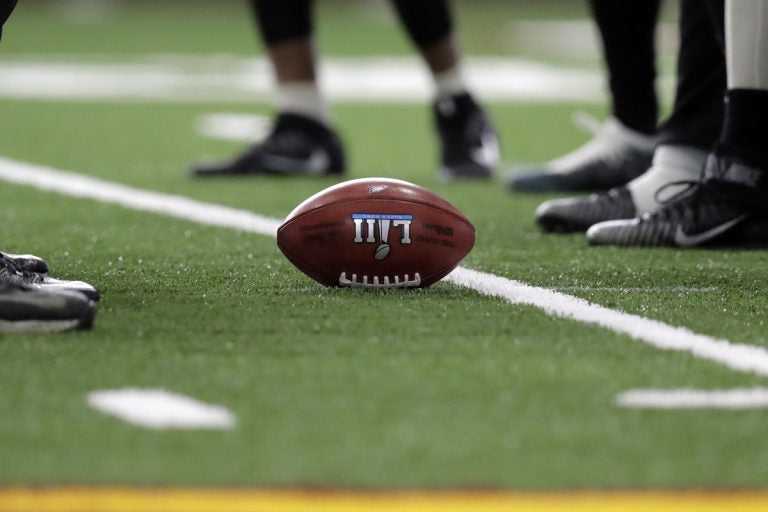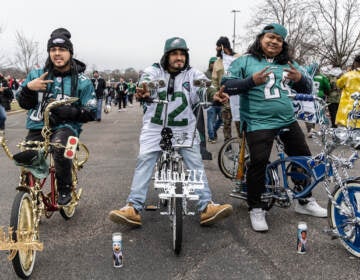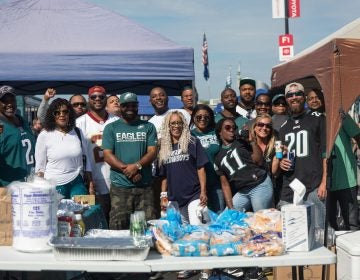Why I broke up with football, even with the Eagles in the Super Bowl
I wavered in my resolve when President Donald Trump called for boycotting the NFL, not wanting to align myself with his position even if our motives were completely different.

An NFL football with the LII logo is used during a Philadelphia Eagles practice for the Super Bowl 52 football game Thursday, Feb. 1, 2018, in Minneapolis. (AP Photo/Eric Gay)
I was minutes old when I became a football fan.
My mom’s two younger brothers, at the hospital for the birth of their first niece, took my tiny hands in theirs and gently pushed my middle and ring fingers toward my palms, then crossed my thumbs over the folded digits so that I was flashing a double “Hook ’em Horns” sign — the universally recognized gesture of University of Texas sports fans — in the general direction of my very exhausted mother.
So began a lifetime of football fan bona fides. My high school played against the school from “Friday Night Lights,” and I wept with joy the year we won. Even after leaving Texas for Philadelphia, I’d call my grandmother regularly to discuss the Longhorns. I got my sorority at Penn to cancel a chapter meeting scheduled on the day the Eagles won the 2004 NFC championship. My husband and I bonded over football and spent many Saturdays early in our relationship watching ESPN, from the start of “College Gameday” to the conclusion of the final West Coast game. My relationship with the sport was not surface. I loved football.
Was. Loved. Past tense. Because football and I have been drifting apart for several years now. At the beginning of this season, I made the difficult decision to break up with football.
I think it started when Tom Brady basically said in an interview that men should verbally abuse the women they want to date. Or maybe it was the first time Ben Roethlisberger was accused of sexual assault, and the NFL declined to take any disciplinary action — or the second, when he received little more than a slap on the wrist and later received a contract extension with the Steelers to the tune of almost $90 million. Yet, still I watched. These were teams I rooted against, anyway.
I cried when the Eagles signed Michael Vick after his release from prison. As a pit bull lover (and later, owner), I didn’t want him here. But it wasn’t just what he and his co-defendants had done to the dogs at the Bad Newz Kennel that upset me.
I believe absolutely that anyone convicted of a crime should have an opportunity for rehabilitation. The difficulty that many ex-convicts have in “going straight” after their release, because of the discrimination they face, is tragic. But Vick had been convicted of extremely violent acts and was signed to a $1.6 million contract (with the option for a second year at over $5 million) while an acquaintance of mine with a minor drug conviction struggled to feed his family.
In a city that had, at the time, the highest incarceration rate in the country, and a state where 10 to 15 percent of the African-American population had felony records, Vick’s contract (low in NFL terms, but more money than many people will make in a lifetime) was just evidence that a felon’s worth was determined by how much he could earn for his bosses, not by any true marks of repentance or rehabilitation.
I sought another team to cheer for and settled on the Ravens. Baltimore isn’t far, and besides, during Vick’s time in Philadelphia, the Ravens drafted now-Eagle Torrey Smith, his polar opposite — when it came to dogs, at least. Smith devoted (and still devotes) a fair amount of time and money to animal rescue organizations. But then came the team’s abominable handling of Ray Rice’s videotaped assault of his future wife, so the Ravens organization no longer had my support either.
I thought about finding another team, but as more details about the Rice incident and the NFL’s response to it emerged, I wavered in my support of the league. Stories of other players’ wives and girlfriends who had been assaulted by their partners and disbelieved or ignored by the league followed over the next few years.
Meanwhile, Colin Kaepernick was being labeled a troublemaker for his silent protest of police violence against, and mass incarceration of, black men. I made the decision to limit my football-watching time, as much as I could, to college teams. College ball was my true football love, anyway.
But I was kidding myself. At least NFL athletes were getting paid. University presidents and coaches were getting rich on the backs of their student-athletes — many of them black and brown — in a system that has been likened, and not unfairly, to chattel slavery. Players with career-ending injuries frequently lost their scholarships and had to leave school. And here, too, was a system all too ready to cover up or write off its players’ abuse of women (thus giving them implicit permission to assault more women after they went pro) if it meant a shot at another national championship.
The parallels between the NCAA and NFL continued. Closer to home, Owen Thomas, a University of Pennsylvania lineman who played on the same field onto which I had once gleefully thrown toast, committed suicide and was later revealed to have had chronic traumatic encephalopathy — the same degenerative brain disorder the NFL denied for years could result from the sport. (A 2017 study found signs of CTE in 110 out of 111 brains of deceased former NFL players and in 48 out of 53 brains of deceased former college players.)
With the accumulation of all these things and more, I decided that I could not, in good conscience, continue to follow, spend money on, or throw parties around football.
I wavered in my resolve early this season when President Donald Trump called for a boycott of the NFL, not wanting to align myself with his position even if our motives were completely different. But Kaepernick was still unsigned, and the broad league support for his position felt insincere. I had a problem with the owners who continued their whisper campaign against Kaepernick while speaking of solidarity with his protest. If I gave up on my protest of the sport, wouldn’t I be just as hypocritical?
Football became for me like that ex-boyfriend you share a lot of mutual friends with and can’t help but run into. I made a deliberate decision to distance myself, but I wasn’t going to walk out of a bar or leave a friend’s party if football was on. I bore no ill will toward the majority of players, but I didn’t want to invite either the NCAA or the NFL into my home.
I spent the night of the NFC championship sitting on my sofa with my dog, watching the SAG awards. At times, my finger itched to push the buttons on my remote control that would guide me to the game, but I remained firm. I could tell the Eagles had won by the impromptu fireworks that erupted all over my South Philly neighborhood, by the car horns blaring down Moyamensing Avenue, by the ecstatic whoops and Eagles chants I heard the rest of the night as people cut through Dickinson Square Park on their way home.
And I’m happy for my fellow Philadelphians. I am. The city bleeds green, and I get that, because I came from a family that bled burnt orange. I will be thrilled for my friends and neighbors if the Eagles win. And I’ll be thrilled for the team’s likeable and extremely socially conscious players if they beat a team whose owner donated $1 million to Trump’s inauguration. I love a good underdog story. I love my adopted hometown. And anything that makes my fellow Philadelphians happy, makes me happy.
I also love seeing a good “Sad Tom Brady” meme.
But on Sunday, I’ll be in Collingswood, meeting a friend’s new baby for the first time. The game will be on, and they know I’m not watching it. That ex-boyfriend of mine will be at my friend’s house, just across the room. I’m happy to know he’s doing well, even if I don’t have a place for him in my life anymore.
—
Jillian Ashley Blair Ivey is a South Philadelphia-based writer, editor, and communications strategist. She has a BA in English from the University of Pennsylvania, an MFA in creative writing from Rutgers, The State University of New Jersey at Camden, and has published under her own byline at publications including DAME Magazine and The Frisky. Follow her on Twitter, Medium, or Instagram.
WHYY is your source for fact-based, in-depth journalism and information. As a nonprofit organization, we rely on financial support from readers like you. Please give today.




